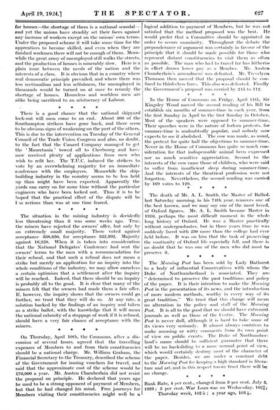On Thursday, April 10th, the Commons, after a dis- cussion
of several -hours, agreed that the travelling expenses of Members to and from their constituencies should be a national charge. Mr. William Graham, the Financial Secretary to the Treasury, described the scheme of the- Government for issuing vouchers for travel, and said that the approximate cost of -the scheme would be £70,000 a year. Mr. Austen Chamberlain did not resist the proposal on principle. He declared that years ago he used to be a strong opponent of payment of Members, but that he had changed his mind. Free journeys. for Members visiting their constituencies might well be a logical addition to payment of Members, but he was , not satisfied that the -method proposed was the best. He would prefer that a Committee should be appointed in order to secure unanimity. Throughout the debate the preponderance of argument was certainly in favour of the principle that it should be made possible for those who represent distant constituencies to visit them as often as possible. The man who had to travel far has hitherto in effect drawn lower pay as a Member. Mr. Austen Chamberlain's amendment was defeated. Mr. Tre%-elyan Thomson then moved that the proposal should be con- fined to third-class fares. This also was defeated. Finally the Government's proposal was carried by 245 to 112.
* * *


































 Previous page
Previous page